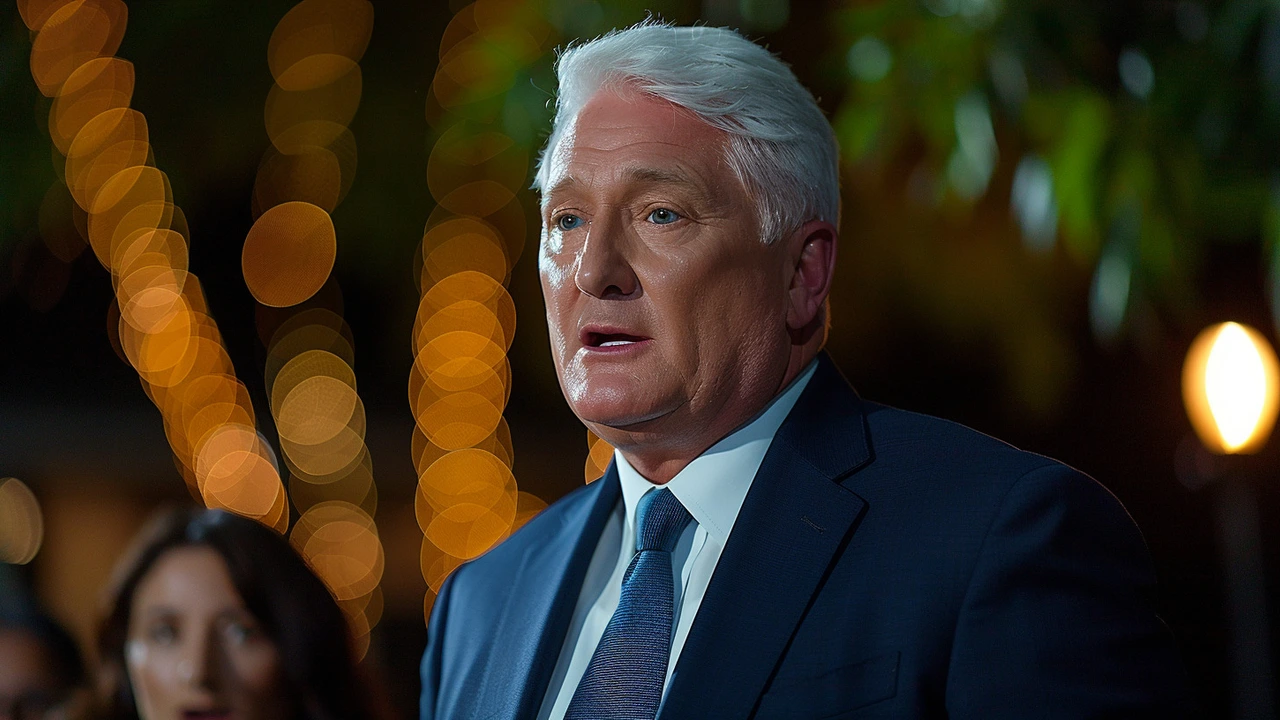Biden's Debate Performance Shakes Reelection Campaign Amid Trump Challenges
During the recent presidential debate between Joe Biden and Donald Trump in Atlanta, the stakes couldn't have been higher. For Biden, who is seeking reelection, this debate was seen as a crucial chance to revive a campaign that has been faltering in recent months. However, the evening turned out to be anything but favorable for the incumbent president. His performance was widely deemed lackluster, with many drawing unfavorable comparisons to the earliest poorly received televised debates from the 1960s.
Biden's Struggle to Connect
Biden's challenges in the debate were evident almost from the first moments. Despite the absence of a live audience, which should have made the atmosphere less pressurized, Biden struggled to effectively articulate his vision for the country. His responses were often disjointed, and his subdued demeanor did little to convey the urgency and passion needed to inspire voters. Analysts have described his performance as his weakest to date, raising serious concerns about his ability to effectively lead the nation.
This perceived lack of engagement and energy has particularly damaging implications given Biden's already fragile standing in several key battleground states. With his prospects dwindling, the Democratic Party finds itself in a state of introspection and concern. Discussions within the party have intensified, with some questioning the sustainability of Biden's candidacy and others debating the necessity of a strategic shift to reinvigorate the campaign.
Trump's Commanding Presence
Meanwhile, Donald Trump, despite his own controversial and divisive tactics during the debate, appeared more assertive and in control. Trump's approach, though often criticized for its reliance on falsehoods and inflammatory rhetoric, came across as forceful and commanding, particularly in the debate's visual narrative. While Trump's handling of topics, especially concerning the Capitol insurrection, drew rebuke from various quarters, his delivery contrasted sharply with Biden’s, underscoring a stark difference in their on-stage personas.
Trump used the platform to target Biden directly, capitalizing on his hesitations and amplifying the narrative of Biden's alleged ineffectiveness. This assertiveness, despite its flaws, may have played well to a base looking for a strong and decisive leader, further complicating Biden’s path to connect with undecided voters.
Democratic Party at Crossroads
The fallout from the debate has left the Democratic Party grappling with tough questions. Biden's ability to communicate effectively, inspire confidence, and project his leadership qualities has been called into question. The debate, intended as a turning point, ended up exposing vulnerabilities that the campaign can ill afford at this critical juncture. The possibility of a significant turnaround now seems slim unless there is a drastic change in strategy or presentation from the Biden camp.
There is an ongoing debate on the potential need for a replacement or a major strategic shift within the party. This internal turmoil is a significant hurdle just months away from the election. While some Democrats remain hopeful that Biden can recover, others are pushing for alternative approaches to salvage the reelection bid.
Future Prospects
The path ahead for Biden is fraught with uncertainty. To regain momentum, the Biden campaign needs to address the weaknesses highlighted in the debate effectively. This might involve more dynamic public engagements, clearer articulation of policies, and a stronger appeal to key voter demographics. The urgency of such a turnaround cannot be overstated, as the chance to firmly reestablish his leadership in the crucial battleground states diminishes with each passing week.
For Biden, the next few months will be critical. His ability to overcome this challenge will depend on how well he can reinvigorate his campaign and reassert his vision for America. Properly addressing the critical feedback from the debate and reshaping his public image may prove essential to navigating through the current crisis and ensuring a viable path to reelection.
The political landscape remains fluid, and the stakes are exceptionally high in this election cycle. As the Democratic Party deliberates on its next moves, it is clear that bold and decisive action will be necessary to alter the current trajectory of Biden's campaign. Only time will tell if such efforts will lead to a dramatic and much-needed turnaround in his reelection prospects.




We all know that politics is a mirror reflecting our collective hopes and fears 😊. In moments like this debate, the image can look a bit cracked, but that's a chance to polish it together. Biden’s stumble reminds us that leadership isn’t just about what’s said, but how it resonates with everyday folks. Let’s channel that energy into constructive dialogue and keep pushing for policies that uplift every community. Remember, the future is built on the tiny steps we each take, so stay hopeful and keep the conversation going! 🌟
Honestly the whole debate was a display of sheer incompetence its like watching a toddler try to pilot a plane the facts were ignored and the logic flimsy yeah
The performance highlighted a concerning deficit in strategic communication, which could impede the incumbent's ability to rally the electorate. Maintaining a robust national narrative is essential for preserving United States sovereignty and global leadership. It is imperative that any future discourse reflects unwavering confidence in American exceptionalism.
I think we should focus on what unites us rather than what divides us. A calm discussion can help everyone understand the key issues better.
First, let’s consider the historical context: debates have long served as a litmus test for presidential competence; therefore, any perceived weakness can have cascading effects. Second, the audience-though virtual-still expects clarity, substance, and vision; without these, the campaign’s momentum may stall. Moreover, policy articulation should be concise yet comprehensive, bridging the gap between rhetoric and practical solutions. Finally, I recommend a strategic recalibration: increase town‑hall engagements, refine messaging, and employ data‑driven outreach to reconnect with swing voters. By implementing these steps, the campaign can restore confidence and regain its competitive edge.
The debate exposed glaring inconsistencies in Biden’s platform, particularly on economic recovery and foreign policy; his evasive answers do little to inspire confidence. While Trump’s approach is undeniably aggressive, it at least offers a clear, if controversial, vision that mobilizes his base. The real issue lies in the Democrats’ inability to present a coherent alternative that resonates with undecided voters.
It’s clear that the recent debate has left many Americans feeling uncertain about the direction of our nation, and that uncertainty can be a powerful catalyst for change; however, it also means we must be careful not to let fear dictate our choices. First, we must acknowledge that President Biden’s performance was not without merit – he offered moments of empathy that reminded viewers of the human side of governance. Second, the lack of vigor in his delivery should not be dismissed outright, as fatigue can affect even the most seasoned leaders. Third, we need to examine the structural challenges facing the campaign, including the media narrative that often amplifies missteps while downplaying successes. Fourth, the Democratic Party should prioritize inclusive dialogue, inviting voices from all demographics to shape policy proposals. Fifth, it is essential to address the economic anxieties that many voters expressed, offering concrete plans for job creation and inflation control. Sixth, healthcare remains a top concern; clear messages about affordability and accessibility are crucial. Seventh, the climate agenda must be communicated in a way that balances environmental urgency with realistic implementation strategies. Eighth, education policy should focus on equity, ensuring that underprivileged communities receive the resources they need. Ninth, foreign policy discussions need to convey both strength and diplomacy, reassuring allies while deterring adversaries. Tenth, the campaign’s digital outreach should be transparent and authentic, avoiding the pitfalls of misinformation. Eleventh, grassroots organizing can reignite enthusiasm at the local level, fostering a sense of ownership among supporters. Twelfth, we must remember that political rhetoric can be polarizing; striving for common ground benefits the entire electorate. Thirteenth, the media’s role is pivotal – balanced reporting can help voters make informed decisions. Fourteenth, voter turnout initiatives are essential; every vote counts in close battleground states. Finally, by embracing a collaborative spirit and learning from the debate’s lessons, the party can chart a hopeful path forward for the upcoming election.
Yo, Biden gotta step up his game, else we’re just stuck watching replays of old speeches.
I totally get where you’re coming from – let’s keep the conversation respectful and focus on solutions.
Trump’s theatrics are a circus, but at least he’s not mumbling like a stale politician.
The debate was uneven; viewers noticed the contrast sharply.